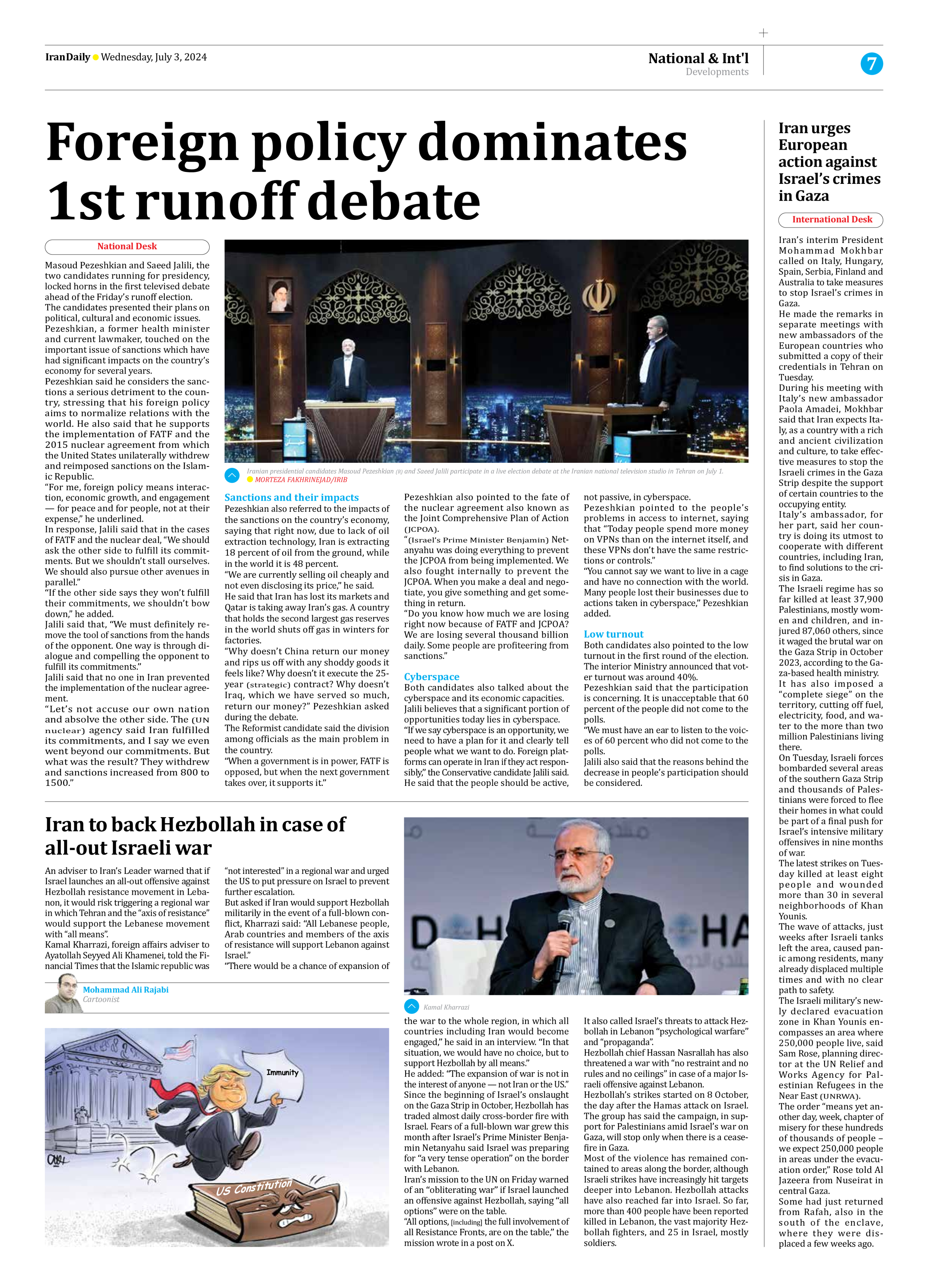
Foreign policy dominates 1st runoff debate
Masoud Pezeshkian and Saeed Jalili, the two candidates running for presidency, locked horns in the first televised debate ahead of the Friday’s runoff election.
The candidates presented their plans on political, cultural and economic issues.
Pezeshkian, a former health minister and current lawmaker, touched on the important issue of sanctions which have had significant impacts on the country’s economy for several years.
Pezeshkian said he considers the sanctions a serious detriment to the country, stressing that his foreign policy aims to normalize relations with the world. He also said that he supports the implementation of FATF and the 2015 nuclear agreement from which the United States unilaterally withdrew and reimposed sanctions on the Islamic Republic.
“For me, foreign policy means interaction, economic growth, and engagement — for peace and for people, not at their expense,” he underlined.
In response, Jalili said that in the cases of FATF and the nuclear deal, “We should ask the other side to fulfill its commitments. But we shouldn’t stall ourselves. We should also pursue other avenues in parallel.”
“If the other side says they won’t fulfill their commitments, we shouldn’t bow down,” he added.
Jalili said that, “We must definitely remove the tool of sanctions from the hands of the opponent. One way is through dialogue and compelling the opponent to fulfill its commitments.”
Jalili said that no one in Iran prevented the implementation of the nuclear agreement.
“Let’s not accuse our own nation and absolve the other side. The (UN nuclear) agency said Iran fulfilled its commitments, and I say we even went beyond our commitments. But what was the result? They withdrew and sanctions increased from 800 to 1500.”
Sanctions and their impacts
Pezeshkian also referred to the impacts of the sanctions on the country’s economy, saying that right now, due to lack of oil extraction technology, Iran is extracting 18 percent of oil from the ground, while in the world it is 48 percent.
“We are currently selling oil cheaply and not even disclosing its price,” he said.
He said that Iran has lost its markets and Qatar is taking away Iran’s gas. A country that holds the second largest gas reserves in the world shuts off gas in winters for factories.
“Why doesn’t China return our money and rips us off with any shoddy goods it feels like? Why doesn’t it execute the 25-year (strategic) contract? Why doesn’t Iraq, which we have served so much, return our money?” Pezeshkian asked during the debate.
The Reformist candidate said the division among officials as the main problem in the country.
“When a government is in power, FATF is opposed, but when the next government takes over, it supports it.”
Pezeshkian also pointed to the fate of the nuclear agreement also known as the Joint Comprehensive Plan of Action (JCPOA).
“(Israel’s Prime Minister Benjamin) Netanyahu was doing everything to prevent the JCPOA from being implemented. We also fought internally to prevent the JCPOA. When you make a deal and negotiate, you give something and get something in return.
“Do you know how much we are losing right now because of FATF and JCPOA? We are losing several thousand billion daily. Some people are profiteering from sanctions.”
Cyberspace
Both candidates also talked about the cyberspace and its economic capacities.
Jalili believes that a significant portion of opportunities today lies in cyberspace.
“If we say cyberspace is an opportunity, we need to have a plan for it and clearly tell people what we want to do. Foreign platforms can operate in Iran if they act responsibly,” the Conservative candidate Jalili said.
He said that the people should be active, not passive, in cyberspace.
Pezeshkian pointed to the people’s problems in access to internet, saying that “Today people spend more money on VPNs than on the internet itself, and these VPNs don’t have the same restrictions or controls.”
“You cannot say we want to live in a cage and have no connection with the world. Many people lost their businesses due to actions taken in cyberspace,” Pezeshkian added.
Low turnout
Both candidates also pointed to the low turnout in the first round of the election. The interior Ministry announced that voter turnout was around 40%.
Pezeshkian said that the participation is concerning. It is unacceptable that 60 percent of the people did not come to the polls.
“We must have an ear to listen to the voices of 60 percent who did not come to the polls.
Jalili also said that the reasons behind the decrease in people’s participation should be considered.







